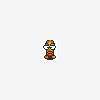I was watching a ProJared video and he suggested that having deaths without warning is flawed game design. I have to say that's not always true.
If there's a predictable pattern to it you did get a warning- your first death. Having a passageway with death traps to memorize is just another variety of challenge. One that can be enjoyable.
Now, if it's unpredictable and obscenely hard that's one thing, but don't tell me you can memorize the Z1 forest path N-W-S-W, and that's fair, but you can't remember to fall left, right, right, left, right down a shaft with spikes? Same exact challenge, who cares if you lost a life while you learned or not? What did you really lose? A few minutes? Seriously. Big deal.
Vanishing blocks aren't popular, but how is it no one seems to mind in Zelda when you have to memorize the order to hit switches in? Same exact challenge. The only difference is the number of deaths on your final counter. A silly little number. Why is that so upsetting to people? It's not offensive to retry a level, it's not any negative reflection on the player. In reality the number of deaths just symbolizes the number of attempts. Are there any puzzles in Zelda you tried several times before getting them right? Each time you tried again is the result of failing before. In either case, losing a life or not, you failed the challenge, then you retried. In both cases you lost a little time. That's all. Nothing more.
If you have to retread a lot of a level to get back I can understand the frustration, but if it's nothing more than a game over screen versus a "wrong" buzzer and a puzzle reset... that's just a difference between SFX and animations between attempts. How is one worse than another? Why do people associate "game over" with "you did bad" and a second attempt without dying as "no big deal"? It doesn't make sense. In either case you failed and retried, one should not be considered more severe than the other.
Why give one retry format more weight than another? It is only a virtual experience after all.
I know there is a slight bit of a rant mixed in here (because this topic bothers me), but there are also legitimate points being made.
Edited by Cukeman, 22 September 2017 - 05:02 PM.








